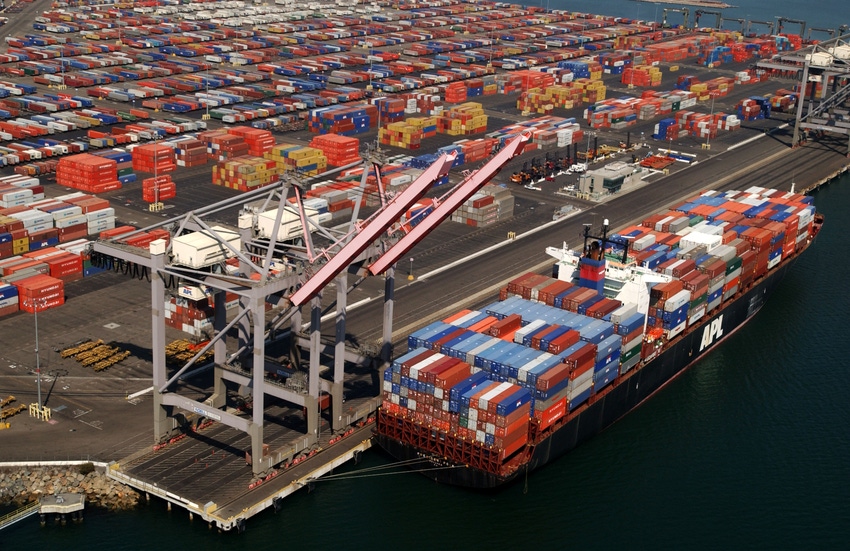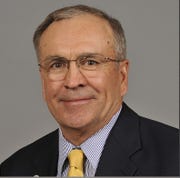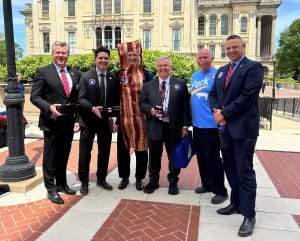Hidden optimism: America’s pig farmers tread ahead
TPP is for the next generation of pork producers


John Weber, NPPC President
Since feed costs have been so affordable, U.S. pork producers have experienced some level of profitability despite the gradual decline in hog prices. As a result, there is an enthusiasm to run at full capacity and look at expansion, notes John Weber, Iowa hog farmer and National Pork Producers Council president.
The large supply of hogs is unquestionably a combination of suitable production fundamentals — production efficiency picking up, low disease pressure and moderate expansion. That is exactly what is bringing extra pigs to the market.
“We are now approaching our packing capacity, and it could be difficult months ahead. We actually expect not seeing a price recovery until the month of January to create that competition for a healthy marketplace,” says Weber.
However, lower hog prices will stir demand.
“When meat prices decline, it makes more affordable protein sources for American consumers and it also, despite the headwinds, makes us more competitive in the overseas markets. We have been facing a strong U.S. dollar for almost two years and very stiff global competition,” says Weber. “Lower prices will move product globally and domestically.”
Background optimism
Nevertheless, hog producers are treading ahead with their heads held high, knowing there are better days ahead.
America’s pig farmers are fully aware of the necessity to gain market access around the world and the importance of trade agreements like the Trans-Pacific Partnership. They are all in and eager to supply delicious, safe pork to the global customer. Weber says, “I call it hidden optimism. They are really not afraid to pull the trigger on expansion, thinking there will be better markets in the future.”
Hog producers, such as Weber, and their supportive association are working diligently to increase U.S. pork market access, including securing positive trade deals such as TPP, to legitimately growing markets around the globe. Weber stresses, “TPP is for the next generation of pork producers.”
Currently, the approval of TPP by U.S. Congress is in a holding pattern. Weber, joined by 130 hog producers from 20 states, took to Capitol Hill last month, urging for a TPP vote this year.
While NPPC leadership anticipates a TPP vote in the lame-duck session, the presidential election is impacting the free trade agreement dialogue. “I have never seen a presidential campaign, period, where trade was the front and center issue. The country faces a whole host of issues, but trade was there every time they spoke,” Weber points out.
He adds, “Where we sit today is both presidential candidates (Donald Trump and Hillary Clinton) are leaving question marks about U.S. trade and how competitive we want to be in a global marketplace. I think a lot of it is political rhetoric, trying to persuade voters. It has really shed an unusual light on normal legislative activity.”
As a result of political pressure being placed on Congressmen to stay in line with their parties on this issue, lawmakers who usually support and lead the charge on trade are missing in action on TPP.
In the remaining weeks of the presidential election campaign, NPPC is still confident in the approval of TPP. Weber says, “When you talk to people, the majority realize the importance of trade to the U.S. economy.
“We are going to keep beating that drum to the very end. In the last 30 days, we have tried to lift the bar and tell our Congressmen that we still want TPP. It is a good deal for agriculture and the U.S. economy.”
Since TPP is a legacy issue with the Obama administration, NPPC still thinks the vote will happen this year.
Unfortunately, Weber notes that the other 11 countries involved are waiting on the United States to pull the trigger on TPP. They are closely watching the U.S. presidential election campaign and the legislative action. He says, “We know the other countries want us to pass it, and I think it will then pass in all the other countries immediately.
“All 11 countries are pork-consuming countries in a big way. It is access to over half billion new consumers. These economies are progressive and growing. You cannot just ignore that,” Weber further explains. “I personally do not think you can isolate yourself away from that type of market. I think it would be a financial disaster not only for your own personal operation but for the country in general.”
Although U.S. pork producers have not banked on TPP passage at this point, they look forward to it. For now, their background optimism will fuel the effort to reduce trade barriers and open future markets.
NPPC is the voice of the hog producers, and the organization is going to continue to work hard for the industry. Weber concludes, “I wish economic times were better for producers. When frustration occurs, we (NPPC) like to hear from producers to help them get through this period. We certainly look forward to better times ahead.”
About the Author(s)
You May Also Like


